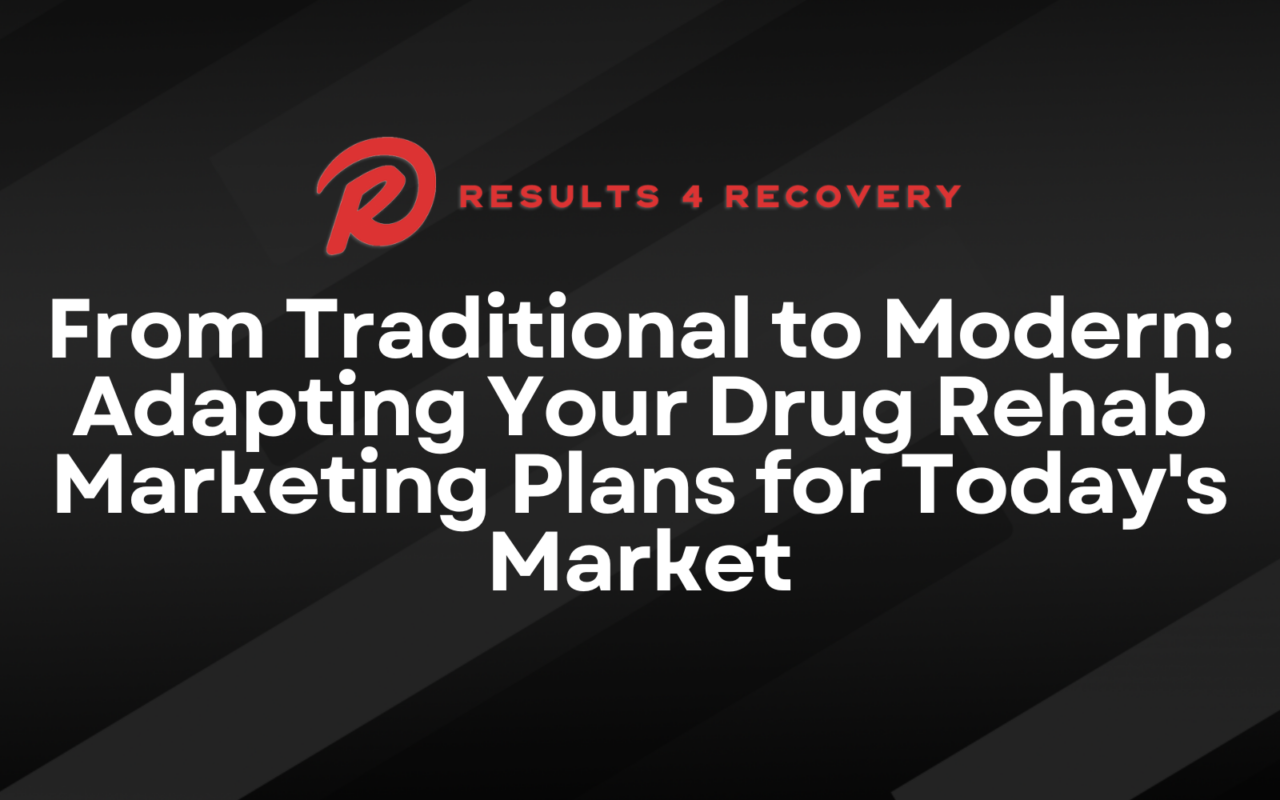Transforming Drug Rehab Marketing Plans for the Digital Age
Drug rehabilitation centers have long been a beacon of hope for individuals battling addiction, providing essential services and support to help them reclaim their lives. For decades, these centers have played a crucial role in the recovery journey, offering personalized treatment plans, therapy sessions, and community support. However, as the landscape of marketing continually evolves with rapid advancements in technology, traditional marketing methods may no longer suffice in effectively reaching those in need. Today, the key to reaching more individuals and standing out in the increasingly competitive market lies in adapting your drug rehab marketing plans to incorporate modern strategies that resonate with potential clients. This means leveraging digital platforms, social media channels, and search engine optimization techniques to enhance visibility and engagement. In this blog post, we’ll delve into the evolution of drug rehab marketing plans, emphasizing the growing importance of establishing a strong online presence. We will also discuss actionable strategies that can significantly enhance your visibility and impact in this vital sector. Whether you’re a rehab center administrator looking to attract more clients, a healthcare professional seeking to expand your outreach, or a family member eager to support a loved one on their recovery journey, these insights will provide invaluable guidance to navigate the changing landscape of drug rehab marketing plans effectively. By embracing these modern approaches, you can help ensure that those struggling with addiction find the help they desperately need.
The Importance of Online Presence
A strong online presence is crucial for reaching a wider audience and establishing trust with potential clients. In today’s digital age, your website serves as the face of your rehab center and is often the first point of contact for individuals seeking help. It should not only provide comprehensive information about your services but also highlight your staff’s qualifications and expertise, showcasing their dedication to patient care. Including success stories and testimonials from former clients can further enhance credibility and demonstrate the positive impact of your programs. Additionally, maintaining a blog with informative articles on recovery, wellness tips, and industry trends can engage visitors and position your center as a valuable resource in the community.
Website Essentials
To create an effective online presence, ensure your website is not only user-friendly but also informative and engaging. Include comprehensive details about your center, such as its history, mission, and the various services offered, including therapy options, support groups, and aftercare programs. Highlight client testimonials to build trust and showcase success stories that resonate with potential clients and their families. Additionally, optimize your site for search engines by incorporating relevant keywords, meta descriptions, and quality content so that it ranks at the top of search results when someone searches for drug rehab centers in your area. This approach will help attract more visitors and ultimately assist those in need of support.
The Digital Shift
With the advent of the internet, social media platforms, and comprehensive online directories, the way people seek information has changed dramatically, revolutionizing the landscape of consumer behavior. In today’s digital age, a staggering 81% of consumers engage in thorough online research before making any purchase decisions, as highlighted by Adweek. This significant shift in behavior emphasizes the necessity for drug rehab centers to establish a robust and engaging online presence that resonates with potential clients. To effectively capture the attention of those seeking help, drug rehab centers must prioritize optimizing their websites for search engines, ensuring that they appear prominently in search results. This includes using relevant keywords, creating informative blog posts, and maintaining an intuitive website design that enhances user experience. Additionally, leveraging social media platforms is crucial for connecting with potential clients on a more personal level. By sharing success stories, informative articles, and engaging content, these centers can build a community and foster meaningful interactions. Moreover, providing valuable content that addresses common questions and concerns can significantly enhance their visibility and authority in the field. This content can take various forms, including FAQs, informative videos, and downloadable guides that equip individuals with knowledge about the recovery process. Such resources not only help those in need to make informed decisions but also establish credibility and trust in an increasingly competitive landscape. In a world where information is just a click away, having a strong online strategy is essential for reaching and supporting those seeking help. By embracing digital marketing and engagement techniques, drug rehab centers can position themselves as reliable resources, ultimately guiding more individuals toward the support they require on their journey to recovery.
Social Media Engagement
Platforms like Facebook, Instagram, and Twitter are incredibly powerful tools for connecting with individuals who need help and support. By utilizing these social media platforms, you can share valuable content that resonates with your audience, whether it’s informative articles, inspiring success stories, or helpful tips. Engaging with your followers through comments, live sessions, and interactive posts fosters a sense of community and trust. Additionally, showcasing your unique approach to rehabilitation, including personal anecdotes and behind-the-scenes insights, not only highlights your expertise but also makes your message more relatable and impactful. Embrace these platforms to create meaningful connections and make a difference in the lives of those seeking assistance.
The Evolution of Drug Rehab Marketing Plans
Traditionally, drug rehab centers primarily relied on word-of-mouth referrals, local advertisements, and networking within the community to attract clients. These methods involved building strong relationships with local healthcare providers, community organizations, and even families to spread the word about their services. Such approaches were particularly effective during times when competition was limited, and the audience was more localized; potential clients often turned to trusted sources when seeking help, making personal recommendations invaluable. Moreover, community events and workshops not only helped centers establish a presence but also fostered trust and awareness about the importance of rehabilitation services in the community. These events provided opportunities for educational outreach, allowing rehab centers to inform the public about addiction, recovery processes, and available resources. Families would often attend these workshops to learn how to support their loved ones, creating a more informed and supportive environment. However, as the landscape of treatment options has evolved, these centers now face increasing competition from newly established facilities, online resources, and alternative therapies. This shift has created a pressing need for more innovative outreach strategies, such as digital marketing, social media engagement, and targeted campaigns, to reach a broader audience and effectively convey their unique value propositions. Embracing technology and modern communication methods will be essential for these centers to remain relevant and continue providing vital support to those in need.
Search Engine Optimization (SEO)
SEO is critical for ensuring that your website stands out among the vast sea of online content. It involves not just optimizing your site with relevant keywords, but also creating high-quality content that engages your audience and meets their needs. Additionally, it’s essential to ensure that your website is mobile-friendly, as a significant portion of web traffic comes from mobile devices. By implementing these strategies, you can improve your site’s visibility on search engines, attract more visitors, and ultimately drive conversions. Investing in SEO can lead to long-term benefits, setting your website apart in a competitive digital landscape.
Key Elements of SEO for Rehab Centers:
- Relevant Keywords: Use terms like “drug rehab marketing plans” strategically throughout your content.
- Quality Content: Provide informative and engaging content that answers potential clients’ questions.
- Mobile Optimization: Ensure your website is easily accessible on all devices.

Pay-Per-Click (PPC) Advertising
PPC (pay-per-click) advertising is a powerful tool that enables businesses to place targeted ads on popular search engines and social media platforms. This form of advertising allows you to reach a specific audience based on their interests, demographics, and online behavior, ensuring that your ads are seen by potential clients who are more likely to engage with your brand. One of the key advantages of PPC is its cost-effectiveness; you only pay when someone clicks on your ad, which means that your budget is spent on genuine interactions rather than mere impressions. This model not only maximizes your advertising ROI but also provides valuable insights into consumer behavior and preferences, allowing you to refine your marketing strategies over time. Additionally, with tools available for tracking and analytics, you can monitor the performance of your ads in real-time, making adjustments to improve results and achieve better outcomes for your business.
Creating Effective PPC Ads:
- Target Audience: Select your audience carefully to reach those seeking help for addiction.
- Compelling Messaging: Use language that resonates with individuals looking for rehabilitation services.
Content Marketing
Content marketing involves the strategic creation and sharing of valuable content designed to attract and engage your target audience effectively. This approach can take various forms, such as blog posts, videos, infographics, and social media updates. By consistently providing informative, relevant, and high-quality content, you not only draw in your audience but also establish your brand or organization as a trusted resource in your industry. This builds credibility and fosters a loyal community, ultimately leading to increased customer retention and conversion rates.
Ideas for Content Marketing:
- Educational Videos: Create videos discussing addiction recovery and treatment options.
- Success Stories: Share testimonials from previous clients who’ve successfully completed your program.
- Sobriety Tips: Offer practical advice for maintaining sobriety post-rehabilitation.
Leveraging Online Directories
Online directories such as Yelp, Google My Business, and Psychology Today have become essential resources for individuals seeking rehab centers. These platforms provide valuable insights, reviews, and ratings from previous clients, helping potential patients make informed decisions about their treatment options. To maximize your center’s visibility and credibility, it’s crucial to ensure that your information—such as contact details, services offered, and operational hours—is accurate and up-to-date on these platforms. Regularly engaging with reviews and responding to inquiries can also help enhance your center’s reputation in the community.
Maximizing Online Directory Listings:
- Accurate Information: Keep your contact details and service descriptions current.
- Encourage Reviews: Ask satisfied clients to leave positive reviews.
- Respond to Feedback: Address negative feedback promptly and professionally.
The Power of Referral Marketing
Word-of-mouth remains a powerful tool in building your business and expanding your client base. Actively encourage current and past clients to share their positive experiences and refer friends and family members who may be in need of assistance. Consider implementing a referral program that rewards those who bring in new clients. Additionally, establishing partnerships with healthcare professionals can be incredibly beneficial, as they can recommend your services to their patients, creating a trusted bridge between your expertise and those seeking help. Building these relationships not only enhances your reputation but also fosters a community of support around your services.
- Building a Referral Network: Reach out to healthcare professionals and organizations in your community.
- Client Incentives: Offer incentives for clients who refer others to your center.
- Professional Partnerships: Collaborate with doctors and therapists who encounter individuals in need of rehab services.
Staying Authentic
While modern drug rehab marketing plans are essential for success in today’s competitive landscape, it’s equally important to remain true to your center’s core values. Authenticity not only builds trust with potential clients but also fosters long-term relationships that can lead to repeat business and referrals. By staying aligned with your core principles, you create a unique identity that differentiates you from competitors who may resort to unethical tactics. This commitment to integrity resonates with clients, making them more likely to choose your services over others. In an age where consumers are increasingly discerning about brand values, prioritizing authenticity can be a powerful asset in your marketing approach.
- Communicating Authenticity: Share your center’s mission and values with potential clients.
- Consistent Messaging: Ensure that all marketing materials align with your principles and messaging.
- Transparency: Be open and honest about your services, treatment methods, and pricing.
Conclusion
Transitioning from traditional to modern marketing approaches is crucial for drug rehab centers aiming to thrive in today’s market. By building a strong online presence, leveraging digital marketing strategies, utilizing online directories, and valuing authenticity, you can reach a wider audience and make a significant impact. Remember, each person seeking help for drug addiction is unique, and your marketing efforts should reflect this understanding. Stay informed about industry trends, adapt as needed, and always prioritize the well-being of your clients. Invest time and resources into enhancing your online presence and modern marketing techniques. The results will not only benefit your rehab center but also provide hope and support to those battling addiction. For more insights and personalized assistance in adapting your marketing strategies, connect with our team of experts by clicking Results 4 Recovery and scheduling a consultation. Together, we can make a meaningful difference in the lives of individuals and families impacted by addiction.














